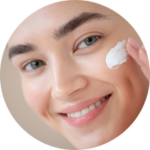How to Build the Perfect Skincare Routine for Glowing Skin
Achieving glowing, healthy skin is a goal for many people. Whether you’re dealing with dullness, dryness, or uneven skin tone, the right skincare routine can make all the difference. However, building a skincare routine that truly enhances your skin’s radiance involves more than just using random products – it requires understanding your skin’s needs and knowing how to treat them effectively. In this guide, we’ll walk you through how to build the perfect skincare routine that promotes glowing skin, tailored to your skin type and concerns.
1. Understand Your Skin Type
Before diving into products, it’s essential to determine your skin type. Your skin type will dictate which products are best suited to your needs. There are five primary skin types:
-
Normal Skin: Balanced skin with no extreme dryness or oiliness.
-
Dry Skin: Skin that feels tight, rough, and may have flaky patches.
-
Oily Skin: Skin that is shiny, especially in the T-zone (forehead, nose, chin).
-
Combination Skin: A mix of both oily and dry areas.
-
Sensitive Skin: Skin that is prone to redness, irritation, and reactions.
Once you identify your skin type, you can focus on products designed to address your specific needs. For glowing skin, hydration is crucial, but you also need to choose products that balance your skin’s oil production and target any concerns such as pigmentation or aging.
2. Cleanse Your Skin Properly
Cleansing is the first step in any skincare routine and arguably the most important. It removes dirt, oil, makeup, and pollutants that accumulate on the skin throughout the day. Cleansing also ensures that your skincare products penetrate the skin better.
For glowing skin, it’s best to choose a gentle, hydrating cleanser. Avoid harsh soaps that strip the skin of its natural oils, as this can lead to dryness and irritation, making your skin look dull. Look for a cleanser with natural ingredients like glycerin, hyaluronic acid, or aloe vera, which help retain moisture and promote a dewy, healthy glow.
For oily or acne-prone skin, you may want to consider a foaming or gel-based cleanser with salicylic acid or tea tree oil to help control excess oil and prevent breakouts.
3. Exfoliate Regularly
Exfoliating is a crucial step in your skincare routine for glowing skin because it helps remove dead skin cells, revealing a fresh and radiant complexion. Dead skin cells can make your face look dull and uneven, so exfoliation is key to getting that natural glow.
There are two types of exfoliants: physical exfoliants (scrubs) and chemical exfoliants (acids).
-
Physical exfoliants: These products contain tiny grains that slough off dead skin cells. Use them sparingly, as they can be abrasive, especially on sensitive skin.
-
Chemical exfoliants: These products contain ingredients like AHAs (alpha-hydroxy acids) and BHAs (beta-hydroxy acids), which dissolve dead skin cells without the need for scrubbing. They are gentler and more effective for long-term glowing skin. Glycolic acid, lactic acid, and salicylic acid are popular choices.
Exfoliate 1–2 times a week, depending on your skin’s sensitivity. Over-exfoliating can lead to irritation and compromised skin barriers, so moderation is key.
4. Tone Your Skin
Toning is often overlooked in skincare routines, but it’s an essential step for glowing skin. A toner helps restore your skin’s pH balance, tighten pores, and add an extra layer of hydration.
Choose a toner that matches your skin’s needs. For dry skin, opt for a hydrating toner with ingredients like rose water or hyaluronic acid. For oily or acne-prone skin, look for a toner with witch hazel or salicylic acid to help control excess oil and prevent breakouts.
Toning prepares the skin to absorb the next steps in your skincare routine more effectively, ensuring that your moisturizer, serum, or other treatments can work their magic.
5. Apply a Serum for Targeted Treatment
Serums are concentrated treatments designed to address specific skin concerns. If you want to achieve glowing skin, look for serums with ingredients that brighten, hydrate, and promote even skin tone. Some key ingredients to look out for include:
-
Vitamin C: Known for its brightening and antioxidant properties, vitamin C helps even out skin tone and fights off free radicals that can dull the skin.
-
Niacinamide: This multitasker works wonders for brightening dark spots and improving skin texture.
-
Hyaluronic acid: Known for its ability to attract moisture to the skin, hyaluronic acid helps plump up the skin and keep it hydrated, creating a glowing, dewy appearance.
-
Alpha Arbutin: This ingredient helps to lighten hyperpigmentation and dark spots, creating a more even complexion.
Apply the serum after toning, and let it absorb for a few minutes before moving on to the next step.
6. Moisturize Your Skin
Moisturizing is essential for glowing skin because it helps maintain hydration and keeps the skin soft and smooth. Regardless of your skin type, never skip this step.
-
For dry skin: Choose a rich, nourishing moisturizer that contains ingredients like ceramides, shea butter, or glycerin to lock in moisture.
-
For oily skin: Opt for a lightweight, oil-free moisturizer with ingredients like aloe vera or hyaluronic acid that hydrate without clogging pores.
-
For combination skin: You might need a balanced moisturizer with a mix of light hydration and oil-control properties.
Consider using a moisturizer with added benefits, such as one that also contains SPF for daytime use. Keeping your skin hydrated not only helps with a glowing appearance but also strengthens your skin’s protective barrier.
7. Don’t Forget Sunscreen
Sunscreen is a non-negotiable step in any skincare routine, especially if you want glowing skin. The sun’s harmful UV rays can cause dark spots, premature aging, and skin damage, which can ultimately dull your complexion.
Opt for a broad-spectrum sunscreen with an SPF of 30 or higher. Mineral sunscreens containing zinc oxide or titanium dioxide are great for sensitive skin, while chemical sunscreens offer a more lightweight option.
Apply sunscreen every morning, even on cloudy days, and reapply every two hours if you’re outside. Protecting your skin from the sun is essential for maintaining an even, glowing skin tone in the long run.
8. Consider Face Masks
Face masks can be an excellent addition to your skincare routine for a boost of glow. Depending on your skin’s needs, you can incorporate masks that target hydration, brightening, or detoxifying effects. Clay masks are great for oily skin, while hydrating masks are perfect for dry skin.
Use face masks 1–2 times a week for an extra glow boost, but be mindful of the ingredients to ensure they’re suitable for your skin type.
9. Stay Consistent
Consistency is key when it comes to skincare. You won’t see glowing results overnight, but by sticking to your routine and using the right products for your skin, you’ll begin to notice improvements over time.
Give each product a chance to work, and avoid constantly switching products. Your skin needs time to adjust to new ingredients and show results.
10. Stay Hydrated and Eat Well
While skincare products are essential, your internal health also plays a significant role in your skin’s radiance. Drink plenty of water to keep your skin hydrated from the inside out. Additionally, eat a balanced diet rich in antioxidants, healthy fats, and vitamins to nourish your skin.
Foods like berries, leafy greens, nuts, and fish high in omega-3 fatty acids can help improve your skin’s texture and overall glow.
11. Incorporate Anti-Aging Ingredients
If you’re looking to maintain a youthful glow, incorporating anti-aging ingredients into your skincare routine can significantly enhance the overall appearance of your skin. As we age, the skin loses collagen and elasticity, which can lead to fine lines and wrinkles. To fight these signs of aging, look for products that contain the following ingredients:
-
Retinol (Vitamin A): Retinol is a powerhouse when it comes to boosting cell turnover and promoting smoother, more youthful-looking skin. It helps fade hyperpigmentation, smooths fine lines, and improves skin texture.
-
Peptides: Peptides help rebuild and repair the skin’s barrier by stimulating collagen production. Incorporating peptides into your routine will support skin elasticity, giving it a firmer and plumper appearance.
-
Coenzyme Q10 (CoQ10): This antioxidant helps to protect the skin from free radical damage, which contributes to signs of aging. CoQ10 also aids in skin regeneration, contributing to a more youthful, glowing complexion.
When introducing anti-aging products, be patient and consistent. While you may not notice dramatic results immediately, with continued use, you should begin to see an improvement in your skin’s radiance and overall appearance.
12. Manage Stress and Sleep Well
Achieving glowing skin is not just about skincare products; your lifestyle habits also play a crucial role. Stress and lack of sleep can manifest in your skin in the form of breakouts, dullness, and irritation.
-
Stress management: High stress levels can trigger hormonal imbalances, which in turn can affect your skin, leading to breakouts or dullness. Practice stress-relieving activities like meditation, yoga, deep breathing exercises, or regular physical activity to keep your stress levels in check.
-
Sleep: Your skin repairs itself while you sleep. Aim for 7-9 hours of quality sleep each night to give your skin time to regenerate. A good night’s sleep can help reduce puffiness, dark circles, and improve skin texture, leaving you with a fresh, glowing complexion.
13. Be Mindful of the Ingredients You Use
In your quest for glowing skin, it’s important to be mindful of the ingredients in the skincare products you choose. Some ingredients may be too harsh for your skin and could cause irritation, which can ultimately hinder your skin’s ability to glow.
For example, products with alcohol and fragrance can be irritating, especially for sensitive skin. Opt for products with natural, clean ingredients like botanical extracts, essential oils, and plant-based moisturizers. This helps avoid unnecessary inflammation and ensures that your skin stays healthy and luminous.
When introducing new products into your routine, always patch test a small amount on your skin to ensure that it doesn’t cause irritation or breakouts.
14. Consult a Dermatologist if Needed
While building a skincare routine on your own can be effective, sometimes it’s best to consult a dermatologist, especially if you’re dealing with persistent skin issues like acne, pigmentation, or eczema. A dermatologist can recommend a customized routine based on your skin’s specific needs and can also prescribe medical-grade products or treatments that can improve skin health more efficiently.
Additionally, dermatologists can advise you on advanced treatments such as chemical peels, microneedling, or laser therapies, which can enhance your skin’s appearance by treating deeper layers of skin. These treatments may help improve texture, remove dark spots, and reveal a glowing complexion.
Conclusion: Building Your Radiant Skin Routine
In conclusion, building a skincare routine that promotes glowing skin is a combination of choosing the right products, adopting healthy lifestyle habits, and being consistent with your regimen. By understanding your skin type, incorporating effective skincare ingredients, and giving your skin time to heal and rejuvenate, you can achieve that radiant glow you’ve always dreamed of. Remember, skincare is a long-term commitment, and results may take time, but with patience, you will see the benefits shine through.






